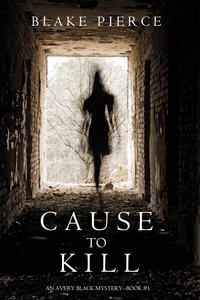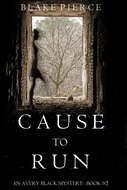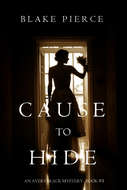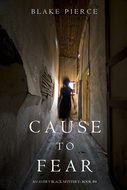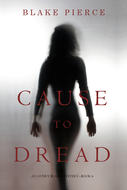Read the book: «Cause to Kill»
Blake Pierce
Blake Pierce is author of the bestselling RILEY PAGE mystery series, which include the mystery suspense thrillers ONCE GONE (book #1), ONCE TAKEN (book #2) and ONCE CRAVED (#3). Blake Pierce is also the author of the MACKENZIE WHITE mystery series.
An avid reader and lifelong fan of the mystery and thriller genres, Blake loves to hear from you, so please feel free to visit www.blakepierceauthor.comwww.blakepierceauthor.com to learn more and stay in touch.
Copyright © 2016 by Blake Pierce. All rights reserved. Except as permitted under the U.S. Copyright Act of 1976, no part of this publication may be reproduced, distributed or transmitted in any form or by any means, or stored in a database or retrieval system, without the prior permission of the author. This ebook is licensed for your personal enjoyment only. This ebook may not be re-sold or given away to other people. If you would like to share this book with another person, please purchase an additional copy for each recipient. If you’re reading this book and did not purchase it, or it was not purchased for your use only, then please return it and purchase your own copy. Thank you for respecting the hard work of this author. This is a work of fiction. Names, characters, businesses, organizations, places, events, and incidents either are the product of the author’s imagination or are used fictionally. Any resemblance to actual persons, living or dead, is entirely coincidental. Jacket image Copyright miljko, used under license from iStock.com.
BOOKS BY BLAKE PIERCE
RILEY PAIGE MYSTERY SERIES
ONCE GONE (Book #1)
ONCE TAKEN (Book #2)
ONCE CRAVED (Book #3)
MACKENZIE WHITE MYSTERY SERIES
BEFORE HE KILLS (Book #1)
AVERY WHITE MYSTERY SERIES
CAUSE TO KILL (Book #1)
PROLOGUE
It was nearly impossible for Cindy Jenkins to leave her sorority’s spring party at the Atrium. The massive penthouse space had been fitted with strobe lights, two stocked bars, and a stellar crystal ball that sparkled down on a dance floor packed with partygoers. Throughout the night, she’d danced with no one and everyone. Partners came and went, and Cindy swung her auburn hair and flashed a perfect smile and sky blue stare at any dancer that happened to appear. This was her night, a celebration not just for Kappa Kappa Gamma pride, but for the many hard years she’d strived to be the best.
Her future, she knew, was assured.
For the last two years, she’d interned at a major accounting firm in town; they recently offered her a position as a junior accountant. The starting salary would be enough to buy a posh new wardrobe and afford an apartment only a few blocks away from work. Her grades? Top of the class. Sure, she could coast until graduation, but Cindy didn’t understand the word “coast.” She was all in, every day, no matter what she was doing. Work hard and play hard, that was her motto; and tonight, she wanted to play.
Another cup of the highly alcoholic “Dreamy Blue Slush,” another Kappa Kappa Gamma cheer, and another dance, and Cindy couldn’t keep the smile off her face. In the strobe lights, she moved in slow motion. Her hair whipped back and her perky nose crinkled at a boy she’d known for years that wanted a kiss. Why not? she thought. Just a peck; nothing serious; nothing to hurt her current relationship, just enough to let everyone at the party know that she wasn’t always a Type-A goodie-goodie that followed the rules.
Friends spotted her and cheered in approval.
Cindy pulled away from the boy. The dancing and alcohol and heat had finally taken its toll. She swooned slightly, still smiling, and held onto the boy’s neck so she wouldn’t fall.
“Do you want to go to my house?” he whispered.
“I have a boyfriend.”
“Where is he?”
That’s right, Cindy thought. Where is Winston? He hated sorority parties. It’s just a bunch of stuck-up girls getting drunk and cheating on their boyfriends, he always said. Well, she thought, I guess I can finally agree! Kissing a boy when she was already committed to another man was probably the raciest thing she’d ever done.
You’re drunk, she reminded herself. Get out of here.
“Gotta go,” she slurred.
“One more dance?”
“No,” she replied, “really, I’ve got to go.”
The boy begrudgingly accepted her terms. Staring lovingly at the popular Harvard senior, he backed away into the crowd and offered a wave goodbye.
Cindy slid a lock of sweaty hair behind her ear and made her way off the dance floor, eyes low, happiness beaming on her face. Her favorite song came on and she spun and swayed to the edge of the crowd.
“Noooo!” her friends moaned, as they saw her trying to leave.
“Where are you going?” one demanded.
“Home,” she insisted.
Her best friend, Rachel, pushed through the group and grabbed Cindy’s hands. A short, stocky brunette, she wasn’t the prettiest or even the smartest of the pack, but her aggressive, sexual nature usually made her the center of attention. She wore a skimpy silver dress, and every time she moved, her body seemed ready to burst out of the garment.
“You can-not-go!” she commanded.
“I’m really drunk,” Cindy pleaded.
“We haven’t even played our April Fool’s prank! That’s the highlight of our party! Please? Just stay a little longer?”
Cindy thought of her boyfriend. They’d been together for two years. That night, they were supposed to have a late-night rendezvous at her apartment. She inwardly groaned at her uncharacteristic dance-floor kiss. How am I supposed to explain that one? she wondered.
“Seriously,” she said, “I have to go,” and, appealing to Rachel’s outrageously erotic nature, she glanced at the boy she’d kissed and humorously added, “If I stay? Who knows what could happen?”
“Oh!” her friends cheered.
“She is out of control!”
Cindy kissed Rachel on the cheek and whispered, “Have a great night. See you tomorrow,” and headed for the door.
Outside, the cool spring air made Cindy take in a deep breath. She wiped the sweat off her face and skipped up Church Street in her short yellow summer dress. The downtown city block was mostly composed of low brick buildings and a few stately houses nestled among trees. A left turn onto Brattle Street and she crossed over and walked southwest.
Streetlamps lit most corners, but a section of Brattle Street was blanketed in darkness. Rather than be worried, Cindy picked up her pace and spread her arms wide, as if the shadows could somehow cleanse her system of alcohol and exhaustion and energize her for the rendezvous with Winston.
A narrow alleyway came up on her left. Instinct told her to be careful; it was, after all, extremely late and she wasn’t oblivious to the seedier side of Boston, but she was also too high to believe anything could possibly stand in the way of her future.
Out of the corner of her eye, she caught movement, and too late, she turned.
She felt a sudden sharp pain in her neck, one that made her catch her breath, and she glanced back to see something shimmering in the light.
A needle.
Her heart plummeted, and her buzz wore off in a single instant.
At the same moment, she felt someone pressing into her back, a single lean arm trapping hers. The body was smaller than her own, but strong. With a yank, she was pulled backwards into the alley.
“Shhh.”
Any thought that it could be a prank vanished the moment she heard the evil, strong voice.
She tried to kick and scream. For some reason, her voice wouldn’t work, as if something had softened the muscles in her neck. Her legs, too, began to feel like Jell-O, and she could barely keep her feet on the ground.
Do something! she implored herself, knowing if she didn’t she would die.
The arm was around her right-hand side. Cindy turned out of the hold, and at the same time jerked her neck back to head-butt her attacker. The back of her skull smacked into his nose and she could almost hear a “crack.” The man swore under his breath and released her.
Run! Cindy pleaded.
But her body refused to comply. Her legs gave out from beneath her, and she fell hard on the cement.
Cindy lay on her back, legs splayed and arms out at opposite angles, unable to move.
The attacker kneeled down beside her. His face was obscured by a sloppily placed wig, a fake moustache, and thick glasses. The eyes behind the glasses sent a chill through her body: cold and hard. Soulless.
“I love you,” he said.
Cindy tried to scream; a gurgle came out.
The man nearly touched her face; then, as if aware of their surroundings, he quickly stood.
Cindy felt herself gripped by the hands and pulled through the alley.
Her eyes filled with tears.
Someone, she mentally pleaded, help me. Help! She remembered her classmates, her friends, her laughter at the party. Help!
At the end of the path, the small man lifted her up and hugged her tight. Her head flopped on his shoulder. He lovingly stroked her hair.
He grabbed one of her hands and twirled her around like they were lovers.
“It’s all right,” he said loudly, as if it were meant for others, “I’ll get the door.”
Cindy spotted people farther off in the distance. Thinking was difficult. Nothing would move; an effort to speak failed.
The passenger side of a blue minivan was opened. He plopped her inside and carefully closed the door so that her head rested on the window.
On the driver’s side, he entered and placed a soft, pillow-like sack over her head.
“Sleep, my love,” she said, turning the ignition. “Sleep.”
The van pulled away, and as Cindy’s mind faded into darkness, her final thought was of her future, her bright, unbelievable future that had suddenly, horribly been snatched away.
CHAPTER ONE
Avery Black stood in the back of the packed conference room, leaning into a wall, deep in thought as she took in the proceedings around her. Over thirty officers packed the small conference room of the Boston Police Department on New Sudbury Street. Two walls were painted yellow; two were glass and looked out upon the department’s second floor. Captain Mike O’Malley, early fifties, a small, powerfully built Boston native with dark eyes and hair, kept moving around behind the podium. He seemed to Avery to be perpetually restless, uncomfortable in his own skin.
“Last but not least,” he said in his thick accent, “I’d like to welcome Avery Black to Homicide Squad.”
A few perfunctory claps filled the room, which otherwise remained embarrassingly silent.
“Now, now,” the captain snapped, “that’s no way to treat a new detective. Black had more arrests than any of you last year, and she nearly singlehandedly took down the West Side Killers. Give her some respect,” he said and nodded toward the back with a noncommittal smile.
Head low, Avery knew her bleached-blond hair hid her features. Dressed more like an attorney than a cop, in her sharp black pantsuit and button-down shirt, her attire, a throwback from her days as a defense lawyer, was yet another reason that most within the police department chose to either shun her or to curse her name behind her back.
“Avery!” The captain raised his arms. “I’m trying to give you some props over here. Wake up!”
She looked around, flustered, at the sea of hostile faces staring back. She was starting to wonder whether coming to Homicide was a good idea after all.
“All right, let’s start the day,” the captain added to the rest of the room. “Avery, you, in my office. Now.” He turned to another cop. “And I want to see you too, and you, Hennessey, get over here. And Charlie, why you running out of here so fast?”
Avery waited for the throng of police officers to leave, then as she began to make her way toward his office, a cop stood in front of her, one she had seen around the department but had never formally greeted. Ramirez was slightly taller than her, lean and sophisticated in appearance, with tan Latin skin. He had short black hair, a shaved face, and although he wore a nice gray suit, there was an ease about his stance and appearance. A sip of coffee and he continued to stare without emotion.
“Can I help you?” she asked.
“It’s the other way around,” he said. “I’m the one that’s going to help you.”
He offered a hand; she didn’t take it.
“Just trying to get a bead on the infamous Avery Black. Lot of rumors. Wanted to figure out which ones were true. So far I’ve got: absentminded, acts like she’s too good for the force. Check and check. Two for two. Not bad for a Monday.”
Abuse within the police force was nothing new for Avery. It had started three years ago when she entered as a rookie cop, and it hadn’t let up since. Few in the department were considered friends, and even fewer trusted colleagues.
Avery brushed past him.
“Good luck with the chief,” Ramirez sarcastically called out, “I hear he can be a real asshole.”
A limp, backhanded wave was offered in reply. Over the years, Avery had learned it was better to acknowledge her hostile partners than avoid them completely, just to let them know she was there and wasn’t going away.
The second floor of the A1 police department in central Boston was an expansive, churning engine of activity. Cubicles filled the center of the expansive workspace, and smaller glass offices surrounded the side windows. Cops glared at Avery as she passed.
“Murderer,” someone muttered under his breath.
“Homicide will be perfect for you,” said another.
Avery passed a female Irish cop whom she had saved from the clutches of a gang den; she flashed Avery a quick glance and whispered, “Good luck, Avery. You deserve it.”
Avery smiled. “Thanks.”
Her first kind word of the day gave her a boost of confidence that she took with her into the captain’s office. To her surprise, Ramirez stood only a few feet outside the glass partition. He lifted his coffee and grinned.
“Come on in,” the captain said. “And close the door behind you.”
Avery sat down.
O’Malley was even more formidable close up. The dye job on his hair was noticeable, along with the many wrinkles around his eyes and mouth. He rubbed his temples and sat back.
“You like it here?” he asked.
“What do you mean?”
“I mean this, the A1. Heart of Boston. You’re in the thick of it, here. Big City Dog. You’re a small-town girl, right? Oklahoma?”
“Ohio.”
“Right, right,” he muttered. “What is it about the A1 you like so much? There are a lot of other departments in Boston. You could have started at Southside, B2, maybe D14 and got a taste of the suburbs. Lots of gangs out there. You only applied here.”
“I like big cities.”
“We get some real sickos here. You sure you wanna go down that road again? This is homicide. A little different than beat.”
“I watched the leader of the West Side Killers flay someone alive while the rest of his gang sang songs and watched. What kind of ‘sickos’ are we talking about?”
O’Malley watched her every move.
“The way I hear it,” he said, “you got played – hard – by that Harvard psycho. He made you look like a fool. Destroyed your life. From star attorney to disgraced attorney, then nothing. And then the switch to rookie cop. That had to hurt.”
Avery squirmed in her chair. Why did he have to rehash all this? Why now? Today was a day to celebrate her promotion to Homicide, and she didn’t want to ruin it – and certainly didn’t want to dwell on the past. What was done was done. She could only look forward.
“You turned it around, though” – he nodded in respect – “made a new life for yourself down here. On the right side this time. Gotta respect that. But,” he said, looking her over, “I want to make sure you’re ready. Are you ready?”
She stared back, wondering where he was going with this.
“If I wasn’t ready,” she said, “I wouldn’t be here.”
He nodded, seemingly satisfied.
“We just got a call,” he said. “A dead girl. Staged. It doesn’t look good. Guys on the scene don’t know what to make of it.”
Avery’s heart beat faster.
“I’m ready,” she said.
“Are you?” he asked. “You’re good, but if this turns out to be something big, I want to make sure you won’t crack.”
“I don’t crack,” she said.
“That’s what I wanted to hear,” he said and pushed some papers on his desk. “Dylan Connelly supervises Homicide. He’s over there now working with forensics. You’ve got a new partner, too. Try not to get him killed.”
“That wasn’t my fault,” Avery complained, and she inwardly bristled at the recent Internal Affairs investigation, all because her former partner – a prejudiced hothead – had jumped the gun and tried to infiltrate a gang all by himself and take credit for her work.
The chief pointed outside.
“Your partner’s waiting. I’ve made you lead detective. Don’t let me down.”
She turned to see Ramirez waiting. She groaned.
“Ramirez? Why him?”
“Honestly?” The captain shrugged. “He’s the only one that wanted to work with you. Everyone else here seems to hate you.”
She felt that knot in her stomach tightening.
“Tread softly, young detective,” he added, as he stood, signaling their meeting was over. “You need all the friends you can get.”
CHAPTER TWO
“How did it go?” Ramirez asked, as Avery exited the office.
She lowered her head and kept on walking. Avery hated small talk, and she didn’t trust any of her fellow cops to talk to her without trading barbs.
“Where are we headed?” she replied.
“All business.” Ramirez smiled. “Good to know. All right, Black; we’ve got a dead girl placed on a bench in Lederman Park, by the river. It’s a high-traffic area. Not really a place you’d put a body.”
Officers slapped palms with Ramirez.
“Go get her, tiger!”
“Break her in right, Ramirez.”
Avery shook her head. “Nice,” she said.
Ramirez raised his hands.
“It’s not me.”
“It’s all of you,” she sneered. “I never thought a police station would be worse than a law firm. Secret boys’ club, right? No girls allowed?”
“Easy, Black.”
She headed toward the elevators. A few officers cheered at getting under her skin. Usually, Avery was able to ignore it, but something about her new case had already shaken her tough exterior. The words the captain had used weren’t typical of a simple homicide: Don’t know what to make of it. Staged.
And the cocky, aloof air of her new partner wasn’t exactly comforting: Seems cut and dry. Nothing was ever cut and dry.
The elevator door was about to close when Ramirez put his hand through.
“I’m sorry, all right?”
He seemed sincere. Palms up, an apologetic look in his dark eyes. A button was pressed and they moved down.
Avery glanced at him.
“The captain said you were the only one that wanted to work with me. Why?”
“You’re Avery Black,” he replied as if the answer were obvious. “How could I not be curious? Nobody really knows you, but everyone seems to have an opinion: idiot, genius, has-been, up-and-comer, murderer, savior. I wanted to sort out fact from fiction.”
“Why do you care?”
Ramirez flashed an enigmatic smile.
But he said nothing.
* * *
Avery followed Ramirez as he walked easily through the parking garage. He wore no tie and his top two buttons were open.
“I’m over there,” he pointed.
They passed a few uniformed officers that seemed to know him; one waved and flashed a strange look that seemed to ask: What are you doing with her?
He led her to a dusty, crimson Cadillac, old, with torn tan seats on the inside.
“Solid ride,” Avery joked.
“This baby has saved me many times,” he relayed with pride as he lovingly pat the hood. “All I have to do is dress like a pimp or a starving Spaniard and nobody pays me any mind.”
They headed out of the lot.
Lederman Park was only a few miles from the police station. They drove west on Cambridge Street and took a right on Blossom.
“So,” Ramirez said, “I heard you were a lawyer once.”
“Yeah?” Guarded blue eyes flashed him a sidelong glance. “What else did you hear?”
“Criminal defense attorney,” he added, “best of the best. You worked at Goldfinch & Seymour. Not a shabby operation. What made you quit?”
“You don’t know?”
“I know you defended a lot of scumbags. Perfect record, right? You even had a few dirty cops put behind bars. Must have been living the life. Huge salary, an endless stream of success. What kind of person leaves all that behind to join the force?”
Avery remembered the house she’d grown up in, a small farm surrounded by flat land for miles. The solitude had never suited her. Neither had the animals or the smell of the place: feces and fur and feathers. From the beginning she’d wanted to get out. She had: Boston. First the university and then the law school and career.
And now this.
A sigh escaped her lips.
“I guess, sometimes things don’t work out the way we plan.”
“What’s that supposed to mean?”
In her mind, she saw the smile again, that old, sinister smile from a wrinkled old man with thick glasses. He’d seemed so sincere at first, so humble and smart and honest. All of them had, she realized.
Until their trials were over and they went back to their everyday lives and she was forced to accept that she was no savior of the helpless, no defender of the people, but a pawn, a simple pawn in a game too complex and rooted to change.
“Life is hard,” she mused. “You think you know something one day and then the next day, the veil gets pulled down and everything changes.”
He nodded.
“Howard Randall,” he said, clearly realizing.
The name made her more aware of everything – the cool air in the car, her position on the seat, their location in the city. Nobody had said his name aloud in a long time, especially to her. She felt exposed and vulnerable, and in response she tightened her body and sat taller.
“Sorry,” he said, “I didn’t mean to – ”
“It’s fine,” she said.
Only it wasn’t fine. Everything had ended after him. Her life. Her job. Her sanity. Being a defense attorney had been challenging, to say the least, but he was the one that was supposed to make it right again. A genius Harvard professor, respected by all, simple and kind, he’d been charged with murder. Avery’s salvation was supposed to come through his defense. For once, she was supposed to do what she had dreamed about since childhood: defend the innocent and ensure justice prevailed.
But nothing like that happened.
